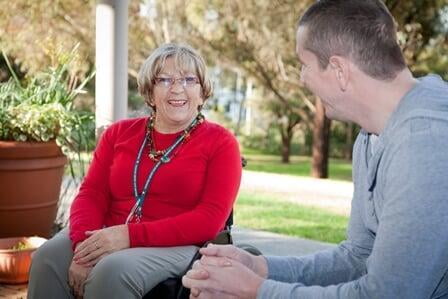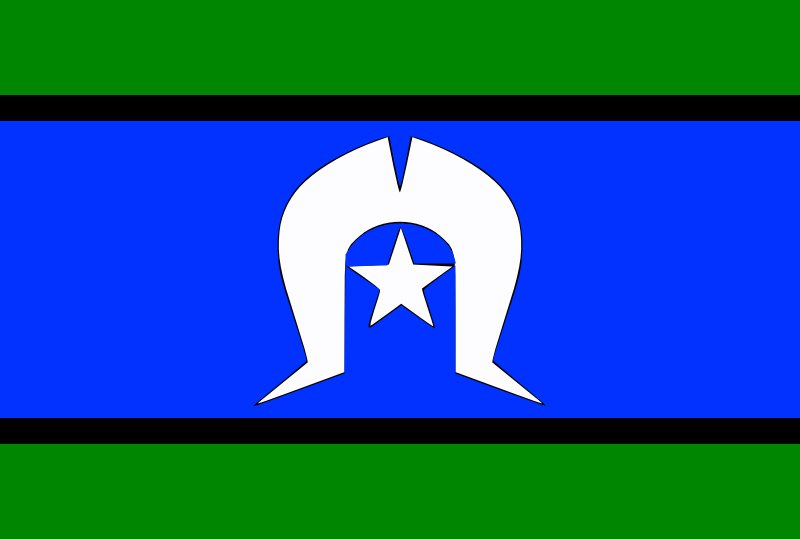Story by Ian Baker
From its beginnings as an office where people with quadriplegia could find paid jobs, AQA Victoria was known for its welcoming and straightforward relations with workers, members and clients.
Robyn Canning, who joined AQA in 1989 as a receptionist, points to founding CEO Ian Bennett as setting the tone.
“Ian was a Ballarat boy through and through,” recalls Canning, who would spend 27 years with AQA, 10 of them as Bennett’s personal assistant and fixer.
“He was a country person. He made AQA an open place. Quads and paras were always dropping in to say Hi.”
In the years immediately after it incorporated in 1987, AQA compiled accident statistics for VicRoads forerunner the Road Traffic Authority – while incubating other projects.
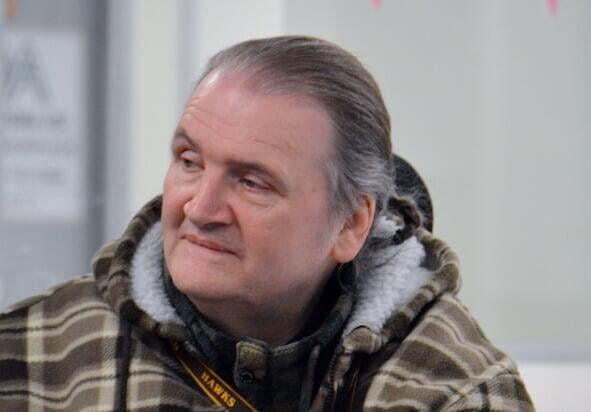
Workaday life
“There were at least eight of us doing that work, and possibly more,” recalls Mark Waterman, who was among a clutch of people living with quadriplegia whom AQA had employed.
Waterman would rise at 5am to prepare for his hour-long ride to the office in Station Street, Fairfield, with an AQA driver in a specially equipped van. He would be delivered home about 6 in the evening.
A conductor on country trains before he was injured in a motorbike crash at 19, Waterman had found this workaday way of life more stimulating than his prior subsistence with his parents at Rosedale in Gippsland, and at Yarra-Me specialist accommodation at Croydon in Melbourne’s east.
“I loved working at AQA,” he recalls from retirement. “I worked there for 28 years.
“The VicRoads work was all paperwork. We would take the accident reports from the Road Traffic Authority, and we would code them.
“It was pieces of paper coming in, and one piece of paper going out with the codes.”
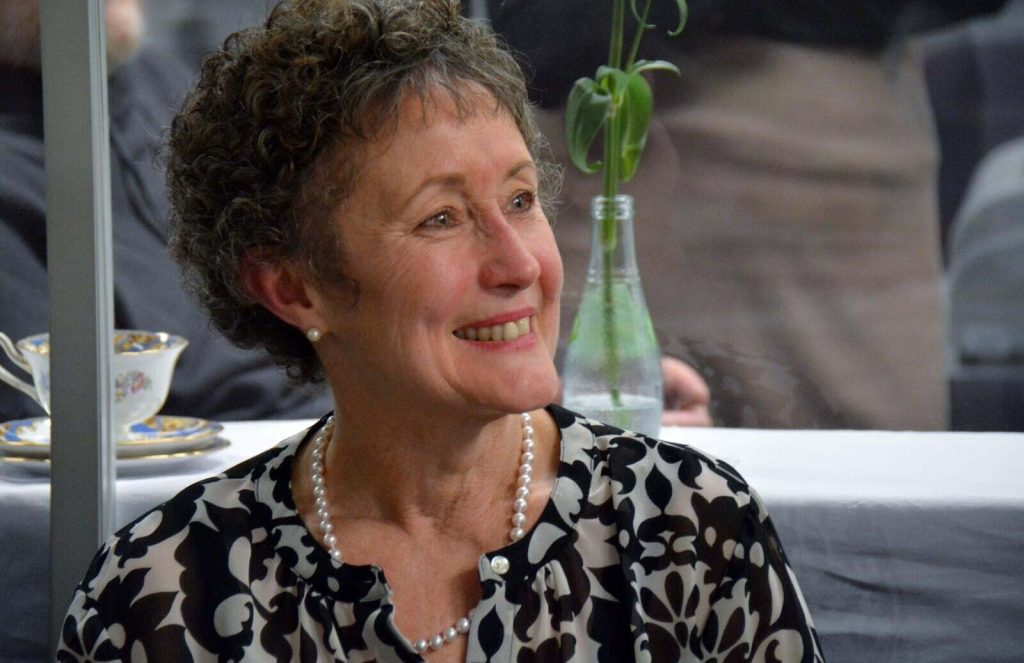
Friday night drinks
Waterman would go on to overseeing the computer-automation of AQA’s payroll, and to operating its desktop publishing service, Copies Plus.
He reveals that he was often home late of a Friday after partying with colleagues and friends at the office.
“We used to have a gambling thing happen,” he remembers. “A mate of mine used to come over and a few of the guys would stay back.
“We’d play acey-deucy or poker. We’d have a video on, and we’d have a few drinks.
“Nobody won big bucks – we’d bet five-cent and 10-cent pieces, maybe a few 20s.
“But we were drinking beer and talking rubbish. It was just really good fun.”
Larger than life
Waterman’s wife, Sharon, tells of a period he spent in hospital for an arm operation. Abandoned by his desk at the office was his wastepaper bin, which had been fashioned in the form of a frog.
“Mark’s workmates would send him photos of his frog from a Friday night, with a smoke hanging out of its mouth – or a bottle,” Sharon remembers.
“And they’d say to him, ‘The Frog had a really good time last week’.”
Canning recalls the Station Street office as “fairly dull looking, with dark wood panelling in the front and this gigantic room at the back that had a bit of partitioning in it.
“There were only about eight or nine employees,” she observes of AQA’s early years. “But they also had people who wandered in and out.”
Memorable for her among the regular crew was Ray Kennedy, who had C4 quadriplegia. Kennedy directed AQA’s incoming phone calls.
“Ray was larger than life,” she says. “A bit of a larrikin, which he would admit himself, but a great guy.
“They had him set up with headphones because he couldn’t use his hands. But he could do things with a stick.”
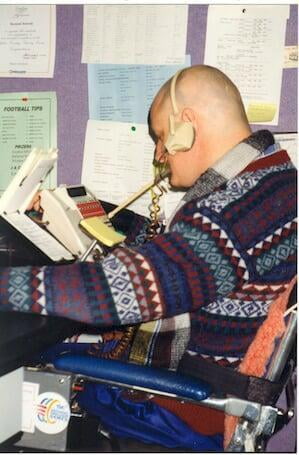
Keenness to help
Canning, who had significant secretarial experience when she joined AQA, remembers herself as groaning inwardly over slip-ups from Kennedy – slip-ups which did not seem to bother him.
But she says he transformed after AQA sent him on a training course for telephonists.
“Having come from a corporate background, it took me a while and some frustrations to understand the office environment I was working in,” Canning remembers.
“Many of our people would never have been in an office in their lives if they had not received a spinal cord injury, I believe. For example, a lot of them had worked in trades.
“AQA was a good place to go, have a bit of a laugh, and do a bit of work to help others.
“They all wanted to help other people who were in their situation.
“But of course, you’ve got to have the infrastructure to support that work.”
Among other employees Canning remembers well from her early years was Greg Kidd, who was developing a peer-support program. Kidd made regular visits to the Austin Hospital and Royal Talbot Rehabilitation Centre, offering hope from his lived experience to people recently injured. Often a companion in these adventures was Kennedy.
Bit of a character
Canning observes that the employment of people with disabilities not only supported those people but also attracted subsidies, and these helped Bennett expand AQA’s services.
Among key initiatives were the AQA NewsLink newsletter and information service, created by Kidd and husbanded for many years by Ian Williams.
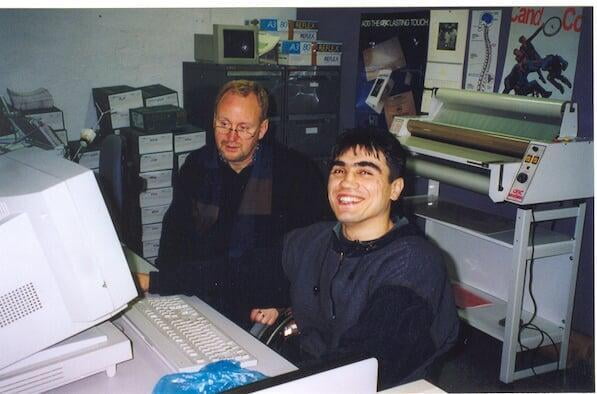
Naz Erdem, who assumed leadership of the Information and Peer Support team in 2000, joined AQA in 1994 as a volunteer assistant to Williams. Williams taught him how to write articles for NewsLink, and initiated him in the arts of its laborious – by today’s standards – production.
Erdem had been living with a C6 spinal cord injury – the same level as Williams’ – from a diving accident at the age of 20. He had contacted the AQA office about two years after his rehabilitation, seeking suggestions for how he could live more productively.
He had known of AQA from his days at the Austin.
“We used to have an outdoor area at the spinal wards, and some of us would spend some time there in the warm weather,” Erdem remembers.
“I remember one guy coming around and just having a chat to all the patients.
“He was clearly a high-level quad – C3 or C4, in a power wheelchair.
“He was pretty upbeat, and was joking with the other patients. He was a bit of a character as well – very likeable.
‘He was clearly a high-level quad. I thought it was really unusual that he could be so upbeat.’
“It was fantastic to see that he was acting normal. In the situation that he was in, I thought it was really unusual that he could be so upbeat.
“I found out later that he was from AQA Victoria, and that his name was Ray Kennedy.”
Super approachable
Peter Trethewey sustained AQA’s tradition of openness when he succeeded Bennett as CEO in 2007.
“I think we are fortunate that our CEOs both have been super-approachable,” Erdem observes. “You can go and knock on their door and talk to them about anything.”
When the office relocated in 2019 to premises at 416 Heidelberg Road, a bespoke interior augmented broad aisles and warm acoustics with retreats where visitors and staff could chat comfortably.
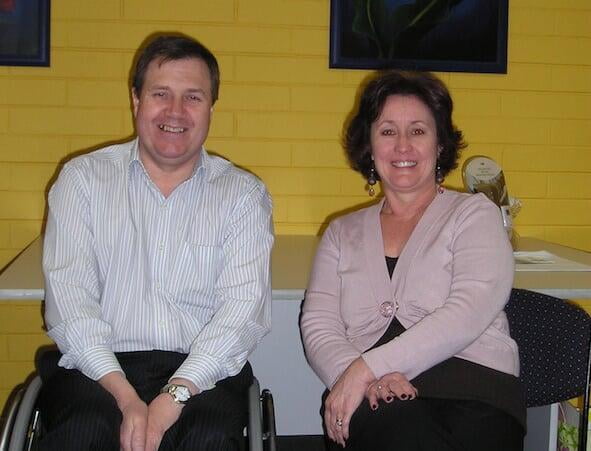
Trethewey has sponsored the development of support networks for people living in regional and rural Victoria. The AQA peer support team facilitates regular get-togethers and group activities in or near major regional centres. It has also fostered a women’s network, and a group for professionals.
Information officer John Theodoropoulos, who helped Mark Waterman operate Copies Plus when he joined AQA in 2000, says the atmosphere at the office has grown more businesslike, however.
“It felt really good that I was providing value to somebody after my accident,” Theodoropoulos, injured in 1992, recalls of his time working with Waterman. “I found the design work really enjoyable.
“Because we were smaller, it was more relaxed then than it is now. We’ve matured. We’re doing more and better things for people, and today when we come in we are all focused more intensely on our jobs. There is less time for informal talk.”
Canning, who retired in 2016 but has visited since, describes the new office as “absolutely fantastic” and says that in some ways she wishes she still had a senior role there.
“I like to think that AQA still has its friendly feel,” Canning says. “Even when the quality-assurance auditors came in, they would say, ‘It’s lovely to come to AQA.’

Trethewey has sponsored the development of support networks for people living in regional and rural Victoria. The AQA peer support team facilitates regular get-togethers and group activities in or near major regional centres. It has also fostered a women’s network, and a group for professionals.
Information officer John Theodoropoulos, who helped Mark Waterman operate Copies Plus when he joined AQA in 2000, says the atmosphere at the office has grown more businesslike, however.
“It felt really good that I was providing value to somebody after my accident,” Theodoropoulos, injured in 1992, recalls of his time working with Waterman. “I found the design work really enjoyable.
“Because we were smaller, it was more relaxed then than it is now. We’ve matured. We’re doing more and better things for people, and today when we come in we are all focused more intensely on our jobs. There is less time for informal talk.”
Canning, who retired in 2016 but has visited since, describes the new office as “absolutely fantastic” and says that in some ways she wishes she still had a senior role there.
- June 30, 2020

